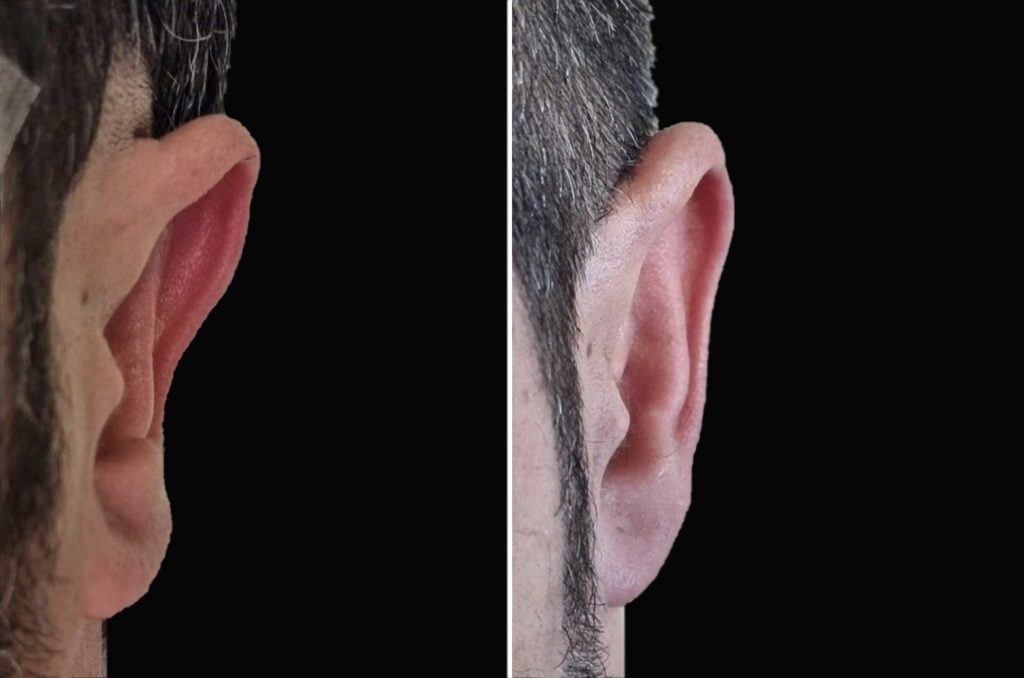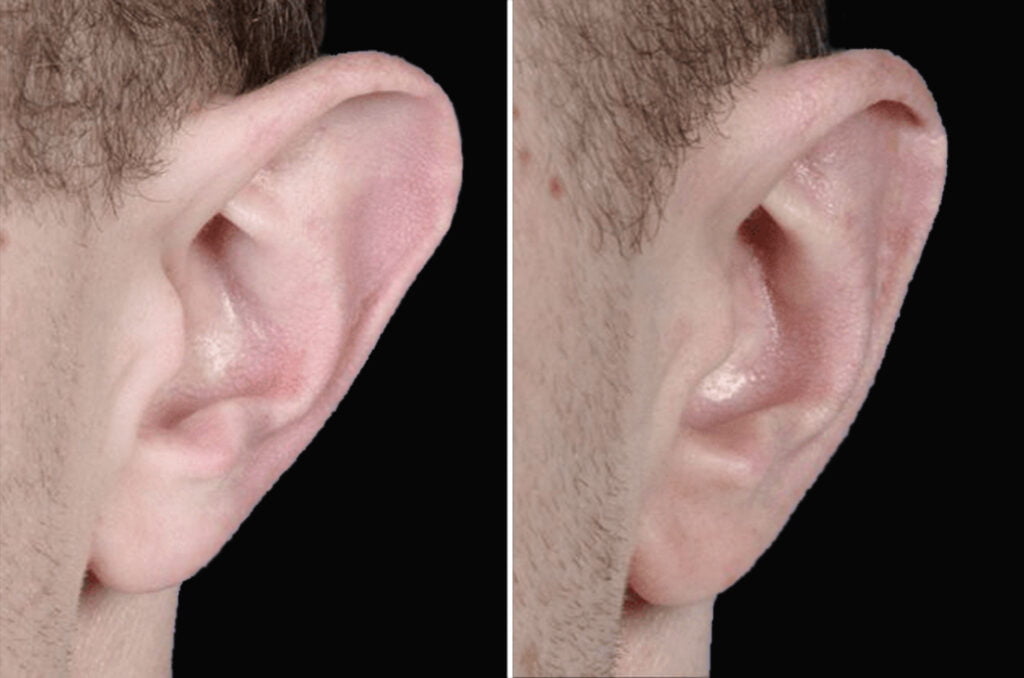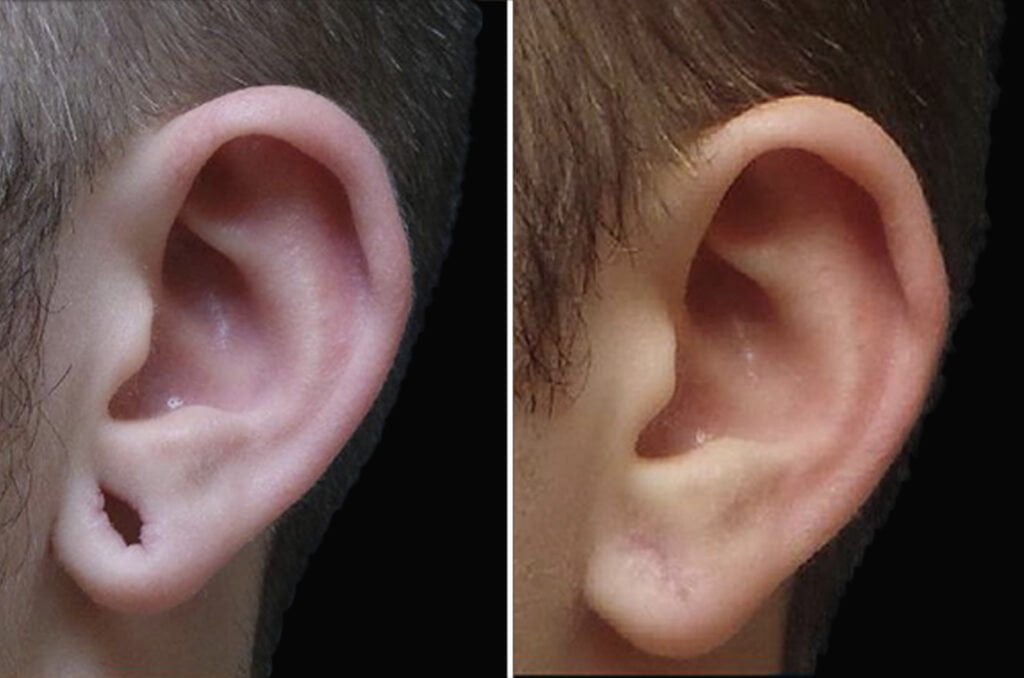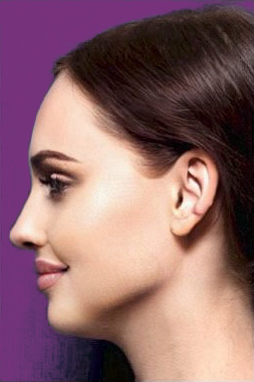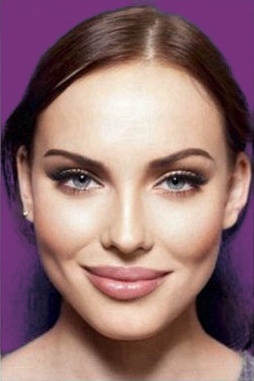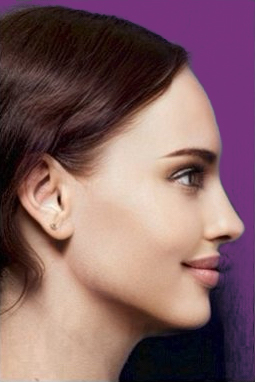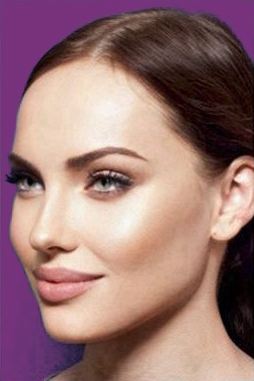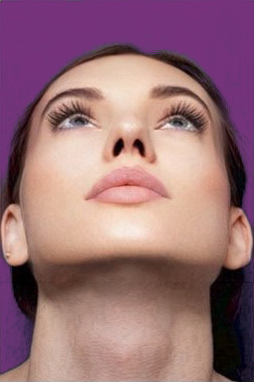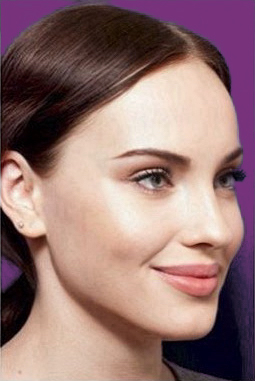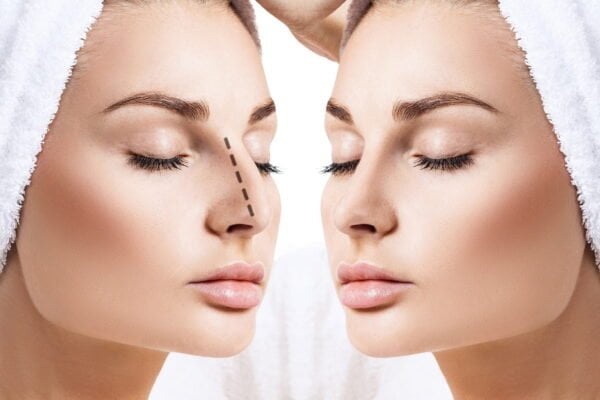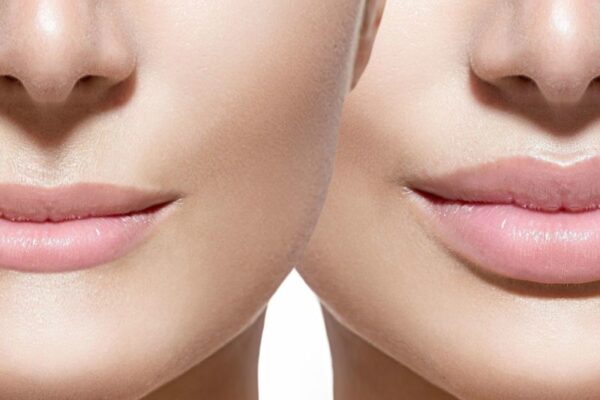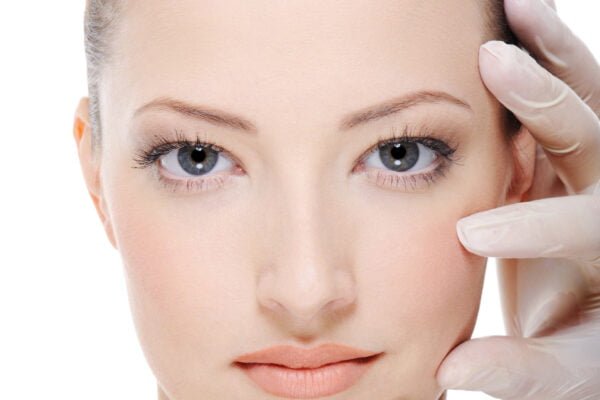Aesthetic otoplasty is performed in case of congenital anatomical abnormalities of the auricle, such as a lobed ear, which often leads to psychological disorders in adolescents. Reconstructive otoplasty is performed in case of trauma, when it is necessary to fully or partially recreate the auricle.
It is one of the fastest and painless surgeries in plastic surgery. Nevertheless, it requires the utmost attention not only to eliminate the defect, but also to give symmetry to the ears.
The whole process takes about two hours. During this time, an incision is made on the back surface of the ear. The ear tissue and skin are separated from the cartilage. Part of the cartilage is removed to form a curl or anti-curl. Earplasty is performed first on one side and then on the other. I am particularly careful about symmetry and constantly assess the identity of the ear flaps.
After that, special fixation stitches and a bandage are applied to keep the ears in the desired position. If the cartilage has been reshaped during the surgery, rollers are first placed on the ears and only then a bandage or dressing is applied to keep it in position.
There are few contraindications to otoplasty, but they do exist because it is surgery. We will be sure to clarify all of this with you during the consultation.
- presence of acute
- infectious or viral diseases;
- cardiovascular disease;
- diabetes mellitus;
- ear infections in chronic or acute form;
- diseases of oncologic nature;
- chronic diseases of internal organs;
- mental disorders;
poor blood clotting; - Raynaud’s disease, endarteritis, inflammatory processes in the area of surgery;
- period of pregnancy and lactation.
I choose the most effective method of correction for each patient individually. And examinations and tests allow me to prevent complications.
BEFORE SURGERY
- follow all my recommendations during the preparation phase, this is the most important thing;
- the key to the success of the surgery is the stable state of your health and optimistic attitude;
- do not hesitate to ask clarifying questions about the processes and stages of the surgery, which you do not understand or cause fear, it will add confidence in the successful result;
- postpone surgery even if you have minor symptoms of acute respiratory infections until you are fully recovered;
- smoking and alcohol consumption can impair your health and affect the rehabilitation process;
- if you are prone to bleeding or if you bruise frequently, tell me at your first consultation;
- one week before surgery, eliminate the intake of all dietary supplements and vitamins;
- inform me in advance if you are taking any medications, including oral contraceptives.
To exclude contraindications, it is necessary to undergo standard preoperative diagnostics. Additional examinations and consultations of specialized specialists may also be prescribed. This is determined on an individual basis. If the patient is a child, I conduct preparatory conversations with him, if necessary, prescribe sedatives.
Diagnostic examinations:
- ECG with a cardiologist’s report;
- fluorography or chest X-ray.
Laboratory tests:
- general blood test (not older than 10 days);
- urinalysis (not older than 10 days);
- coagulogram (ACTH, prothrombin, fibrinogen, not older than 10 days);
- blood group, Rh factor;
- RW (Wasserman reaction), HIV, Hepatitis B and C (HBS, HCV), (not older than 3 months);
- immunoglobulin E test (necessary to detect possible allergies and proper selection of anesthesia);
- biochemical blood test (AlAT, AsAT, total protein, glucose, total bilirubin, creatinine, urea, electrolytes (K, Na), (not older than 10 days).
10 days before the scheduled date of surgery, I recommend completely exclude alcohol and 3 days — smoking cigarettes, which worsen healing and can provoke complications, as well as negatively affect the final result of the surgery.
Cosmetic procedures that aggressively affect the skin (chemical or deep peeling) are not recommended 14 days before the surgery, and 7 days before — visiting a solarium. If possible, eliminate inflammation or irritation on the face.
Also for 14 days you should temporarily suspend the use of anticoagulants (aspirin, heparin, vitamin C, cardiomagnil, thrombo-ACS, painkillers and antipyretics) and hormonal drugs, including contraception. If it is impossible to refuse any medication, be sure to inform me about it at the first consultation, so that I can give recommendations on how best to proceed in such a case: to exclude the drug, replace it or leave it as it is.
The surgery is performed on an empty stomach, so on the eve of the surgery after 8 pm nothing can be eaten! After 12 at night do not drink, even just water! From coffee and energy drinks I advise you to give up at least a couple of days before the surgery.
Menstrual cycle does not affect the surgery, I recommend my patients to plan the date of surgery on the 6th-8th day from the beginning of the cycle. If menstruation occurs earlier than expected, be sure to inform me and the anesthesiologist.
ON THE DAY OF SURGERY
- When going to the clinic for surgery, do not forget your passport and all tests in printed form (make copies in advance if you need a second copy).
- Do not use perfume, cosmetics and any means with a pronounced fragrance. Leave jewelry, valuables and money at home. You will definitely not need them at the surgery ????
- Remove everything from the nail of the forefinger on your left hand, including the false nail. This is necessary for attaching the pulse oximeter (a device to monitor blood oxygen saturation).
- Choose comfortable clothing that you will not have to take off and put on “over your head”. Clothing with zippers or buttons is best.
- If you have varicose veins, you will need compression stockings.
- The evening or morning before otoplasty should be thoroughly washed hair and ears.
Take care in advance how you will get home from the clinic, because you will not be able to drive after the surgery.
I perform otoplasty with a scalpel or laser. In about an hour my patients leave me satisfied and with new ears ????. And to make the rehabilitation as fast as possible, it is important to follow my recommendations.
POST-SURGERY REHABILITATION
On average, recovery takes from two to five weeks and depends largely on the complexity of the surgery, the age of the patient and the body’s ability to regenerate.
During the first few days of the postoperative period, there may be swelling at the surgical site. This is normal and usually disappears on its own as the body recovers.
For the first two weeks of the recovery period, you will need to come to the clinic every few days to change the dressing.
We will be able to remove the stitches 10 days after surgery, provided the recovery process is going well. During earplasty, non-absorbable threads are usually used, but since the incisions are made behind the ears, the correction sites are not visible to others. The final assessment of the results of the operation can be after 3-4 months.
Special compression bandage, which is put on the operated place, may cause discomfort. Despite this, independent removal, loosening or moving the bandage is strictly prohibited. It must be worn for 2-4 months, depending on the speed of recovery.
For several months, when pressing on the ear lobes, painful sensations and discomfort may be noted — this is absolutely normal.
In case of sharp pains, bloody discharge, severe swelling and other abnormal phenomena, you should immediately consult a doctor.
In order for the rehabilitation process to proceed without complications and side effects, the following recommendations should be followed:
- Do not smoke or drink alcohol, it slows down the regeneration process;
- it is necessary for a while to refuse heavy physical exertion, so that there was no displacement of tissues and divergence of sutures;
- the optimal temperature in the room — about 20 degrees Celsius;
Do not visit saunas, baths, take a hot bath, as the edges of the wound under the influence of heat can separate; - when washing your head, try not to get the detergent on the ears, it can cause skin irritation in the area of the scar;
- Do not allow direct sunlight to reach the ears.
POST-OTOPLASTY DIET
Avoid alcohol as long as possible after surgery (at least a month), as it impairs tissue regeneration.
Reduce the salt content in your meals so as not to aggravate tissue swelling and fluid retention after surgery. At the same time, do not be hungry, eat calmly, but keep the portion size the same as usual, because your body needs a lot of energy for recovery.
MEDICINAL PRESCRIPTIONS
You may experience mild, usually very little pain in the postoperative period. If you are hypersensitive, use your usual analgesics.
After surgery, you should not take aspirin or medications containing aspirin or ibuprofen, as they have anticoagulating effects.
After suture removal (7-14 days after surgery), I recommend that my patients gently shower daily and wash their hair with warm water and a mild baby shampoo to keep the wound healing area as clean as possible.
A week-long course of antibiotics may be prescribed to minimize infections after surgery.
You deserve to be the best version of yourself, and my qualifications and experience guarantee a successful outcome! Just make an appointment for a free consultation, it will be the first step towards perfection.
HOW TO MAKE THE PHOTOS RIGHT
You need good quality photos for modeling (selfies are not suitable ????, ask someone to take a picture of you with the main camera). They should be taken in good even lighting, on a solid color background and should not be blurry. Send photos only through the form below, as any messengers will compress the photos and degrade their quality.
Send photos in all the angles shown in the example below ☝ and make sure that the hair does not cover the parts of the face we are interested in.



